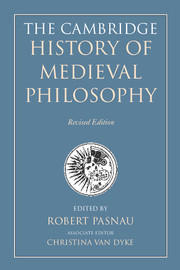Book contents
- Frontmatter
- Contents of Volume 1
- Preface
- List of contributors
- Frontmatter
- Contents of Volume 2
- Introduction
- I Fundamentals
- II Logic and language
- III Natural philosophy
- IV Soul and knowledge
- V Will and desire
- VI Ethics
- VII Political philosophy
- VIII Metaphysics
- IX Theology
- 50 Philosophy and theology
- 51 Faith and reason
- 52 Mysticism
- 53 Arguments for god’s existence
- 54 Describing god
- 55 Providence
- 56 The problem of evil
- Appendices
- Bibliography of primary sources
- Bibliography of secondary sources
- Index nominum
- Index rerum
- References
53 - Arguments for god’s existence
from IX - Theology
Published online by Cambridge University Press: 05 August 2014
- Frontmatter
- Contents of Volume 1
- Preface
- List of contributors
- Frontmatter
- Contents of Volume 2
- Introduction
- I Fundamentals
- II Logic and language
- III Natural philosophy
- IV Soul and knowledge
- V Will and desire
- VI Ethics
- VII Political philosophy
- VIII Metaphysics
- IX Theology
- 50 Philosophy and theology
- 51 Faith and reason
- 52 Mysticism
- 53 Arguments for god’s existence
- 54 Describing god
- 55 Providence
- 56 The problem of evil
- Appendices
- Bibliography of primary sources
- Bibliography of secondary sources
- Index nominum
- Index rerum
- References
Summary
Kant named the three main sorts of argument for God’s existence “ontological,” “cosmological,” and “teleological.” All three sorts were deployed in the Middle Ages. “Ontological” arguments are deductive and have no empirical premises. These originated with Anselm of Canterbury and flourished in the thirteenth century, but fell into disuse afterward, reemerging only with Descartes. Medieval “cosmological” arguments are also deductive, but have at least one empirical premise. Most medieval cosmological arguments depend heavily on material from Aristotle or John Philoponus; the most original medieval contributions were by al-Fārābī and Avicenna. Cosmological arguments typically first infer the existence of something, and then argue that it is God. Although medieval philosophers had much to say on the second score, for reasons of space this chapter focuses only on their existence arguments. Teleological arguments – arguments from design – were not prominent in medieval philosophical theology and mostly remained at an intuitive level. The Middle Ages’ real contribution to natural theology thus lies with the first two sorts, and so this chapter discusses only these.
ONTOLOGICAL ARGUMENTS
Anselm gave the first “ontological” argument in Proslogion 2. The key passage is this:
We believe [God] to be something than which nothing greater can be thought…The Fool…when he hears…“something than which nothing greater can be thought,” understands what he hears, and what he understands is in his intellect. [But] it cannot exist in the intellect alone. For if it exists only in the intellect, it can be thought to exist also in reality, which is greater. If therefore it…exists only in the intellect, this same thing than which a greater cannot be thought is a thing than which a greater can be thought…So something than which no greater can be thought…exists…both in the intellect and in reality.
Let “a G” abbreviate “something than which no greater can be thought.”
- Type
- Chapter
- Information
- The Cambridge History of Medieval Philosophy , pp. 735 - 748Publisher: Cambridge University PressPrint publication year: 2014

